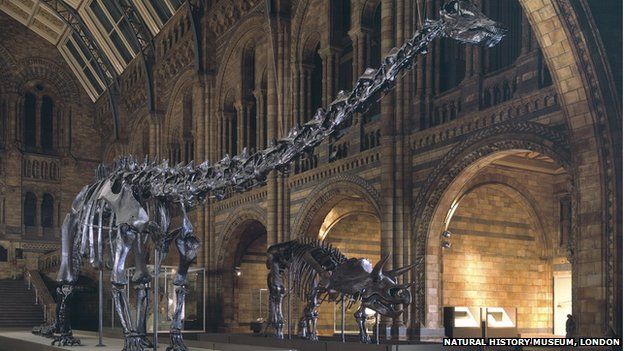Diplodocus v blue whale: How they stack up in numbers
- Published

The hashtag #SaveDippy's been trending on Twitter after London's Natural History Museum announced it was moving its skeleton of a Diplodocus from the museum's entrance.
The dinosaur, nicknamed Dippy, has been there for 35 years but will be replaced by a blue whale in 2017.
Lots of people seem unhappy.
So we've put the pair head to head to see how they stack up. This is Diplodocus v blue whale...
Size
Diplodocus
At an average 26m long (85ft), the diplodocus was about the length of a basketball court.
Its neck alone was 8m long (26ft) and its tail 14m long (45ft).
But considering its impressive length, at only 10,886 kg (1,714 stone) Diplodocus was a lightweight in dinosaur terms, and in a fantasy fight, we reckon the blue whale could take him.
v
Blue whale
At roughly 30 meters long, weighing an average 190,000kg (29,920 stone), the blue whale is the biggest animal ever known to have lived on earth.
Their tongues alone can weigh as much as an elephant. Their hearts, as much as a car.
Their blood vessels are wide enough for a human to swim through.
Winner: Blue whale... Impressive stats Dippy but sadly you've been pipped on this one.
Bones
Diplodocus
292
v
Blue whale
It varies between individual whales but the accepted range is 180-200.
Winner: Diplodocus... a nice simple one. Dippy is the clear winner both on number and on consistency.
Diet
Diplodocus
As a vegetarian, the Diplodocus lived on a diet of leaves from trees and soft plants, mainly ferns, with their necks helping them reach food high and low.
And because of its size, the amount it ate each day was pretty unimaginable, with the dinosaur flattening trees in search of snacks.
They'd also swallow stones to help them digest their food - a process that made them slightly gassy.
We can only imagine how that played out for a creature of that size.
v
Blue whale
You might imagine the giant of the ocean dining out on some pretty big fish.
But the blue whale actually lives on some of the smallest marine life - tiny shrimplike animals called krill (less than 2 inches long), eating up to 40 million of them a day.
Amazingly, the blue whale can scoop up 100,000kg (15,747 stone) of krill-filled water in one mouthful in less than 10 seconds.
GULP!
Winner: Blue whale... Shrimp sounds just that little bit more appetizing, so sorry Dippy but how can you compete with that all-you-can-eat fish buffet?
Number of teeth
Blue whale
Zero.
This gummy mammal is toothless. That's why they go for tiny prey and just gulp down big mouthfuls.
They do however have bristles similar to a comb.
Those are used to filter water back out of their mouths while keeping dinner trapped in the bristles - a bit like a fence.
v
Diplodocus
Hard to count.
The huge amounts of leaves Diplodocus ate meant its teeth suffered heavy wear.
So they were replaced practically every month, with Dippy having up to five spare sets in its mouth at any time.
And with that many gnashers, vegetarian or not, you wouldn't want to get on the wrong side of Dippy.
Winner: Diplodocus... Another hands down win for the Diplodocus, in terms of numbers at least.
But seeing as the blue whale doesn't have to worry about tooth ache, that's a victory of convenience for the mammal.
Bonus round
Diplodocus
To intimidate or defend itself against would-be attackers, the Diplodocus could whip its tail at 800mph, making an almighty cracking sound and breaking the speed of sound.
v
Blue whale
As a deep-water hunter and a mammal, they have to come to the sea's surface to breathe.
When it does that it exhales a cloud of pressurized vapour out of its blowhole, which reaches a whopping 9m (30ft) high.
Winner: Diplodocus... It's a close one but sorry blue whale, with Dippy breaking the sound barrier you've literally been "blown out of the water" on this one. Get it?
Follow @BBCNewsbeat on Twitter, BBCNewsbeat on Instagram and Radio1Newsbeat on YouTube